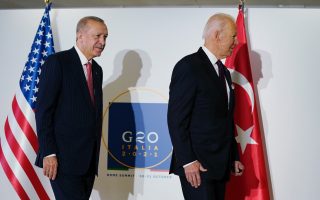Expectations and disappointments

Relations between Greece and the United States have gone through a long honeymoon period that is also due, in part, to the previous SYRIZA government. However, “love” often gives rise to expectations that lead to greater disappointment when they are unfulfilled. As MPs in Athens prepare to debate the new agreement on US military facilities in Greece, it is important to manage expectations deftly.
There have already been disappointments during the negotiations. Even if Alexandroupoli was included in the agreement – much to Turkey’s chagrin – Skyros was not. Perhaps this illustrates the narrow limits of what Athens can negotiate for when dealing with the Biden administration. For better or worse, it was much easier during the Trump-Pompeo era. Those in charge of foreign policy were risk-takers who disregarded the longstanding doctrine of equal distances. US policy became unpredictable, something that scared Recep Tayyip Erdogan. We have now returned to a previous era where the usual bureaucracy can ignore the proposals by diplomats in the region and the primary concern is to “not lose Turkey.” This was clearly illustrated in the case of the EastMed pipeline. No one was really surprised, but the way in which it happened, the clumsiness, sent the wrong message to everyone involved.
At the same time, the debate in Parliament will erode the consensus achieved in one of few areas in recent years. The opposition will vote against the motion and will question what Greece gained out of the agreement. The crisis in Ukraine could potentially escalate the confrontation and force difficult dilemmas upon the government that may be accompanied by a certain level of discord. Moscow will point these out as much as it can.
The United States must take great care in its maneuvers over the next period. It is well aware that in Athens everything related to foreign policy is judged through the lens of Greek-Turkish relations. Another move like the EastMed and more dark clouds will gather on the horizon, ruining this extended “honeymoon.” At the same time, it will also achieve something much more dangerous; it will convince Erdogan that he is free to escalate the situation in the Aegean and the Eastern Mediterranean whenever and however much he desires. When he is not wracked by uncertainty over how an “unpredictable” US president may react and instead has the certainty of dealing with predictable and soft interlocutors, he will attempt to increase the pressure on Greece and Cyprus. As we all know from history and our time at sea, going from idyllic calm to perfect storm is something that happens often in these parts.





